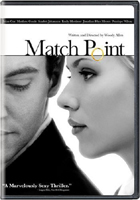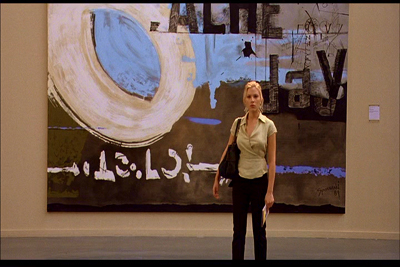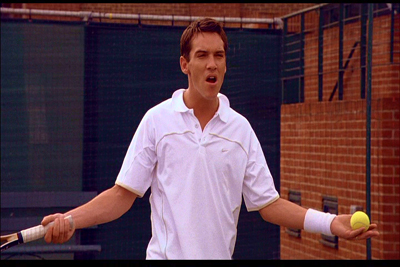 BUY IT AT AMAZON: CLICK HERE!
BUY IT AT AMAZON: CLICK HERE!
STUDIO: DreamWorks
MSRP: $29.99
RATED: R
RUNNING TIME: 124 Minutes
SPECIAL FEATURES: Nichts.
The Pitch
"Woody Allen is old and cynical and still
a damn good filmmaker."
The Humans
Jonathan Rhys-Meyers (
Impossible 3), Scarlett Johansson (your fantasies), Emily
Mortimer (Young Adam), Brian Cox (X-Men 2),
Penelope Wilton (Shaun of the Dead), Matthew Goode (uh… Chasing
Liberty, apparently.)
The Nutshell
Chris Wilton (Rhys-Meyers), a former tennis pro,
winds up teaching backhands at a
club. There he meets the well-off Hewett family and, fully aware of the upward
mobility it offers him, begins courting young Chloe Hewett (Mortimer). Things
go well for the handsome and winning Chris with a fine office job and an
extended family that is quite taken with him, but his ambitions toward
greatness forgot to take into account another great motivator: obsession.
Tom Hewett (Goode) is engaged to a struggling
American actress named Nola, who is played by Scarlett Johansson, and, really,
what self-respecting man wouldn’t be taken with Scarlett? They strike up an
affair, a note of change in Chris’ well-oiled life that begins to offset the
balance and send the whole thing spinning gently out of control.

Let’s see… positive-x, negative-y…
The Lowdown
I know the nutshell doesn’t quite seem to match
up to the stellar reviews this film has been getting (discounting Colbert), but
trust me when I say that reductionist readings to do Match Point
justice. Or, if you don’t trust me, keep reading. This is much more than your
simple boy-meets-girl, boy-meets-another-girl, boy-has-hot-sex-with-Scarlett
Johansson story. Woody Allen has been a master of melancholy for quite some
time, and this meditation on fate finds him at his most despondent and most
morally-conscious yet.
The setup of the plot is familiar, almost
old-fashioned, so it’s entirely appropriate that the style of the movie fall
right in line. Much like Altman’s Gosford Park was a throwback to
an earlier age of whodunit film, so Match Point recalls the simple,
character-driven elegance of fifties noir. Sometimes familiarity breeds
disinterest, but here it feels — mostly — like a welcome presence. It’s the
enduring quality of a story told well.
That story is something of an extension of pretty
much everything Allen has done. He’s a dab hand with the fish-out-of-water
scenario, but here he takes it a bit further; the fish has climbed out of the
water and is beginning to evolve legs and lungs, and finding that he rather
likes a life with gravity. Chris’ ambition is shielded in a remarkably
comfortable skin, despite the social disparity between his youth and his
manhood. When his ambitions begin to crystallize in marriage, employment, and
luxurious living, his mild obsession needs a new direction, and finds it in Nola,
the fish wearing stilts to pretend it has legs.

"How can you be thinking of the calculus at a time like this?"
The tennis metaphor, from which the film gets its
name, is set up in the very first shot and then returns frequently as a motif. The
core of the metaphor is that sometimes luck is the deciding factor in life, not
intention. Sometimes the ball catches the very lip of the net and, for a split
second, could fall either way. All the primary characters, and Chris in
particular, find themselves in these sorts of situations from time to time, and
the recurring philosophy is one of stoicism; you already made your forehand
swing, and now the ball is given over to wind, friction, chaos, and luck. As
Chris says, in one of my favorite lines in the whole thing, "Faith is the
path of least resistance."
Having only one central metaphor to drive the
film gives everything a sense of focus, but at the same time it means that a
lot of mileage comes out of that metaphor. This is where the character work
comes to the rescue. This is one of those rare films that doesn’t waste talent,
despite a wealth of it. All the actors put in terrific performances (special
commendation goes to Emily Mortimer), and, despite all the concern with fate,
Allen’s script leaves them space to be individuals rather than cogs. You know how
in ensemble pieces you tend to lose a few characters by the wayside (think: Lost)?
Allen, with his writer’s hat on, has a tremendous knack for efficient character
growth, fully sketching his peripheral players in just a few short lines of
dialogue, which leaves more time for the main story.
Allen, with his writer’s hat on, isn’t entirely
godlike for the entirety of the film, unfortunately. There is a point, right
around the middle of the second act, when the story takes a turn for the too
familiar and ends up feeling repetitive. When deceit and distance spring up
between Chris and Chloe, when Chris begins stepping out with Nola while Chloe
thinks he’s at work, the suspicion and coldness, well, you might just put on
Pedro the Lion’s "Bad Diary Days" and tune out for a bit. The only
thing that keeps it interesting is Chloe’s newfound obsession with becoming
pregnant.

Somebody’s got a low force-to-flinch ratio.
Those ten or fifteen minutes are a notable dip in
the quality of the film, and it’s quite a dip because the beginning and ending
are phenomenal. I’ve already touched on the introduction to the characters and
the fine work by the actors, so that leaves the third act, which I really
oughtn’t spoil. You can see it coming from quite a ways off, but it’s an
inevitability — a fate — that draws your attention like a deer to distant
headlights.
The tennis metaphor performs ably right up
through the end, when, just as Chris’ abandoning of the pro circuit continues
to haunt him in small ways, the consequences of actions made in the climax
continue long after the game is over. Fate steps in and makes its decision and
then, as an uncaring god, disappears again. For my money, this is one of the
most satisfying endings I’ve come across in a while, and ranks up there in tone
with the beautiful last reel of A History of Violence.
It’s a depressing thought, that faith is the path
of fools and that fate is the one you can trust to act. Allen’s long-standing
ambiguity toward religion, and dead-on applications of practical philosophy,
are two of the many details that contribute to Match Point‘s
success. It’s a thoughtful, engaging, and wise film from a man who knows
exactly how tragedy and comedy are intertwined, and precisely how to tug them
apart.
The Package
Hey, hey, nothing. Audio and video are great,
though.

"All I’m asking is which will land first, Which will land first, Tom?"
8.8
out of 10